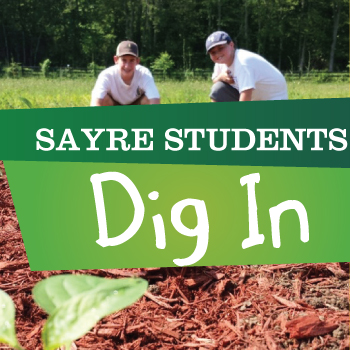Sayre Students Dig In
Farm Project Blossoms on 10 Acres That Yield Pumpkins, Peppers and Plenty of Educational Growth
By John Lynch
 So why is an A.P. English teacher leading a group of Sayre School students in an agriculture class? It’s all about roots.
So why is an A.P. English teacher leading a group of Sayre School students in an agriculture class? It’s all about roots.
At first glance, Sayre’s Courtland Leer seems like an unusual choice to play a key role in the school’s ambitious new school farm project on 10 of the 50 acres at the Sayre Athletic Complex in south Lexington.
After all, his classroom specialty centers on rhetorical technique and advanced argumentative structure.
But dig deeper (and that’s what everyone is doing at the farm) and you learn that Leer represents the past, present and future of Sayre, Lexington’s oldest private school.
Leer, in his fifth year at the school, is a Sayre alum who grew up on a working farm in Bourbon County and knows his way around plants as well as he does participles.
“Actually, Sayre has a tradition of drawing students who come from the agriculture and thoroughbred industries,” said Leer, who minored in environmental studies in college and worked on organic farms before becoming a teacher.
So Leer was a member Sayre’s farm committee that devised and launched this new hands-on, academic program.
And the program has sprouted, blossomed, taken root (the wordplay is unavoidable) among students from pre-kindergarten through high school.
The primary goal, the school states, for establishing the farm is “to provide teachers with an innovative education tool that gives students a dynamic outdoor environment in which to observe, discover, experiment and learn.”
 In little over a year, students have planted native trees and an apple orchard; started an apiary; planted and harvested pumpkins, gourds and a variety of peppers; and planted blackberries and Shitake mushrooms.
In little over a year, students have planted native trees and an apple orchard; started an apiary; planted and harvested pumpkins, gourds and a variety of peppers; and planted blackberries and Shitake mushrooms.
Leer oversees the mushroom project, which teaches students about ecology, and the life cycle of forests and fungi. Students also will learn about economics as they harvest their first crop and eventually bring it to local farmers markets and restaurants.
“Mushrooms help recycle forest matter,” Leer said. “When trees die naturally, mushrooms break them down so that the nutrients can be reused as part of the circle of life in a forest.”
Sayre students drilled holes in 30 logs to plant the mushrooms and will reap their first harvest this spring.
A similar process is taking place with peppers under the direction of Chris McGinley, a middle school English and social studies teacher.
Students planted jalapeno and habanero peppers from seed, harvested them, rid the peppers of seeds and added vinegar and sugar to make 100 jars of pepper jelly, which was a popular item at the school’s fall festival.
McGinley rattles off the lessons students have learned beyond the obvious agriculture skills.
“This has become a science, math and social studies lesson for the students,” he said. “They see how the ingredients all mix together. Students also have worked with scales and accounting to keep track of ingredients.”
With proceeds from the jelly sales, the class bought an old-fashioned grinder. Students took an entire class period to grind grains into enough flour to make two corn chips for each student.
“This gives students a practical lesson about how hard life is in developing nations where they have to grind their own flour,” McGinley said.
The beauty of the farm is that students of all ages learn similar lessons. In elementary grades, students made pumpkin bread, provided pulp for pumpkin pies, seeds for the salad bar, and Sav’s ice cream and will eventually craft birdhouses from gourds.
Their produce also decorated the campus and was provided to families during the fall season.
Deborah Melear, the elementary science teacher, and Joan Skees, the technology specialist in the elementary school, work together to provide farm experiences relating to life science for their students.
UK students from an agriculture sorority helped Sayre students plant apple trees and then discussed the various career paths open to agriculture majors.
Kindergartners planted native trees on the farm that will eventually be donated to the city to become street trees. The farm committee hopes this becomes a tradition at the school where every student plants a tree.
The farm project fits organically with the school’s emphasis on 21st century skills such as creativity, self-initiative and group collaboration, said Stephen Manella, Sayre Head of School.
“The farm is a place where students can study science, agriculture, and economics and come to a deeper understanding of the globe and our collective mandate to make it a better place to live,” he said.
Besides, students love the project. Who wouldn’t want to leave the classroom, get outdoors and make something grow?
Students love it, but they work hard, Melear and Skees said. Students have novel experiences and see the fruit of their labor, including its impact on the school and local community.

